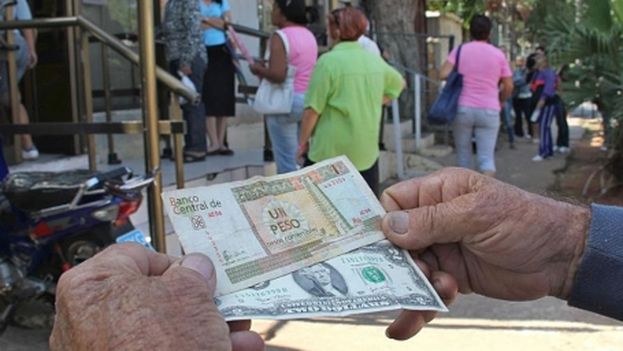
![]() 14ymedio, Carlos Alberto Montaner, Miami, 19 December 2020 — The Cuban regime wants to make reforms. That’s very good. Cuban society is staggeringly unproductive. They will start with the currency. Good thinking! It is useless to make reforms if the essential element, money, is worth very little. Especially in the vicinity of the United States, where His Majesty the Dollar reigns supreme, despite the fact that since 1971 its value is subjectively and arbitrarily measured. (In that year, Nixon removed the US currency from the gold standard.)
14ymedio, Carlos Alberto Montaner, Miami, 19 December 2020 — The Cuban regime wants to make reforms. That’s very good. Cuban society is staggeringly unproductive. They will start with the currency. Good thinking! It is useless to make reforms if the essential element, money, is worth very little. Especially in the vicinity of the United States, where His Majesty the Dollar reigns supreme, despite the fact that since 1971 its value is subjectively and arbitrarily measured. (In that year, Nixon removed the US currency from the gold standard.)
Cuban reformers would do well to look at what is happening just 90 miles from their shores. The exiles, who were prompted to leave by the hideous cry of “we don’t want them, we don’t need them” have prospered enormously. In the USA, with its nuances, things are done as they are carried out in the richest nations on earth.
Let’s talk about the 20%.
A few are “filthy” rich. They are billionaires. For others it is enough to have a few millions. There are many professionals who are very well off. Doctors, lawyers, accountants, bankers, architects. Almost all have money invested in the stock market, second homes, and works of art. Small businessmen join that group. Some will grow to be great. Others will disappear, but along the way they will have learned a useful lesson that they will use in another endeavor.
The remaining 80% are part of the three middle social groups, plus the poor who struggle to join them––the upper middle group, the middle-middle group, the middle-low group and the extremely poor. Fortunately, social mobility is tremendous in the United States. I am not talking about “classes” because it is a closed concept, which Marxists have appropriated (and we can see the results.)
The extremely poor in the USA are those who have up to $25,000 a year for a family of four. Generally, they are poor people with a car, television, air conditioning, heating, drinking water, electricity, telephones, food stamps, police protection, judicial system, schools, and hospitals for free. They live in government “projects” or small subsidized apartments that, in South Florida at least, are called “Plan 8.”
The 20% and the 80%. That is the “Pareto Principle.” It is not a mandatory law of nature. It is a “principle,” an “observation” that is almost always fulfilled. Vilfredo Pareto was a great mathematician of Italian origin who taught at a Swiss university between the 19th and 20th centuries. He set out to find out the historical disparity between those who have resources and those who lack them. Wherever there is freedom to create wealth there are inventors, entrepreneurs, people who stand out for their desire to succeed.
General Raúl Castro should not find it difficult to understand the phenomenon. His father, Ángel Castro Argiz, who arrived from a Galician village wearing espadrilles, when he died in October 1956, left a capital of eight million dollars (the equivalent today of more than 100 million), several hundred workers, a 30-square kilometers farm, equipped with a movie theater, managed by his daughter Juanita, a school and a post office. Without a doubt, Ángel Castro belonged to the 20%.
Today the “Pareto Principle” has become a formula that is studied in marketing and in almost any activity: 20% of the causes generate 80% of the consequences. That is, 20%––more or less–– of products generates 80% of the sales. And 20% of the sellers support 80% of the sales. And so on.
The problem with Pareto’s observation is that it leads to inequality in income. Those who are part of the 20% receive a huge share of the money that society generates.
This is anathema to communists, determined that the results of all people are approximately the same, because they have not taken into account that human beings are different, have different dreams, and expect different remuneration, sometimes of an emotional character.
This means that it is not a matter of reforming the communist system, but of canceling it, and accepting willingly that some citizens live better than the average. It is not a question of making the three currencies disappear, or that children and adults can have a glass of milk when they want and not when central planning decides. It is about asking Cubans if they want to continue with communism or prefer to carry out their transactions as they are carried out in the thirty most prosperous countries in the world.
That’s the key.
____________
COLLABORATE WITH OUR WORK: The 14ymedio team is committed to practicing serious journalism that reflects Cuba’s reality in all its depth. Thank you for joining us on this long journey. We invite you to continue supporting us by becoming a member of 14ymedio now. Together we can continue transforming journalism in Cuba.
